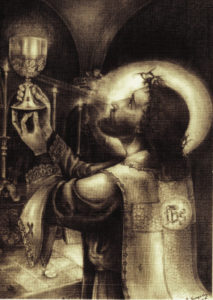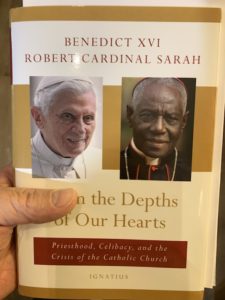
From a reader…
QUAERITUR:
I heard a priest refer to his role as, “not the bouncer to the Eucharistic banquet but the server [as in waiter].”Most analogies fall flat, but this one hit a dissonant chord that I can’t quite resolve with the right explanation. Could you expand on how we can think of the priest at mass. He is offering Christ’s sacrifice but also in persona Christi. Is he actually Christ or just our Lord’s representative?
You are right to underscore that analogies often limp, to the point that they fall flat.
First, that business about not being the “bouncer” strikes me as smarmy virtue signaling tied into the present “coherence” debate. Infra dignitatem.
No one replaces the Lord. However, the Lord, through the ordained, sacramental priesthood gives to men, empowers them, to act “in persona Christi… in the person of Christ”. The priest, when acting as priest in the sacred liturgical action, is “alter Christus… another or ‘second’ Christ”.
We have to admit that there is a powerful dimension of “meal” or “banquet” present in each Holy Mass. It must be so, since Mass is the renewal of the Last Supper. At the same time, the Last Supper was left incomplete until the Cross when the Lord finally drank the final, fourth “cup” of that ritual Supper. While the Supper chronologically preceded the Cross, the Cross gave the Supper its dynamic, salvific force.
Another point. Let’s not forget that we are talking here about a “priest” and not just a “minister”. Perhaps if your emphasis is on “minister” you might think about that guy up there as “the waiter” at “the meal”. That is a pale, incomplete, pitifully limited-to-the-point-of-being-deceptive view of the Catholic priest.
In fact, the very concept of “priest” points unerringly to “sacrifice”. Priests are for sacrifice. That’s their raison d’être: to offer sacrifice. It is not their primary job to serve meals. From their role as priest, alter Christus, who offers The Sacrifice in persona Christi, they also have the ministry of distributing the fruits of that Sacrifice, the Eucharist to the faithful. It’s not the other way around.
Moreover, we have to view the priest not just as the one who offers the Sacrifice, but also as the Sacrifice being offered. Christ was and is both the priest and the sacrificial victim.
If the priest is alter Christus, acting in persona Christi, then the priest at the altar during Mass is both, at the same time, the one who offers Sacrifice and the one who is sacrificed.
This fleshes out the fact that, at the consecration, the priest/victim says: Hoc est corpus MEUM… Hic est calix sanguinis MEI.
He IS Christ and he remains himself. Think of how, when absolving your sins, the priest says, “EGO te absolvo… I absolve you”, not “Christus te absolvat…“. Christ absolves in the person of the priest who is acting in the person of Christ.
What a mystery! It is terrifying and alluring. No one is worthy of this, but Christ works in men anyway.
While the world swirls and ebbs and crashes about us priests, while we see priest after priest being cancelled by bishops – driven at times to material and spiritual ruin by the men who should honor and care for them the most – I take note of the old Carthusian motto: Stat crux dum volvitur orbis… While the world spins, the Cross stands still. The Cross, therefore the Sacrifice of Christ, is the fixed point of the fullness of time. The priest and the Cross are inseparable, for the whole reason of the priest’s priesthood is to offer sacrifice, to renew the Sacrifice of Calvary as alter Christus, in persona Christi capitis.
It is the understanding of the priest as one who offers the Sacrifice that gives any meaning to the priest as servant at the Eucharistic banquet. Without the dimension of Sacrifice, the right view of priesthood, it is nearly inevitable that the moment of Communion will devolve, as it has far and wide, into the time when someone puts the white thing in your hand and then you sing a song.
There is a corrective.
 Card. Sarah and Pope Benedict have a book that deals with priesthood, From The Depths Of Our Hearts: US HERE – UK link HERE – French HERE. The Church and her priesthood are in a serious crisis, as is clear from the remark of some priests that they are “waiters”. Card. Sarah and Benedict get into the reasons why.
Card. Sarah and Pope Benedict have a book that deals with priesthood, From The Depths Of Our Hearts: US HERE – UK link HERE – French HERE. The Church and her priesthood are in a serious crisis, as is clear from the remark of some priests that they are “waiters”. Card. Sarah and Benedict get into the reasons why.
If the myriad options for the priest in this heaving world are confusing, and if there have been deep flaws in the formation of priests – as Sarah and Benedict hold – there is one thing that the priest can always do, without dependence on the permission or approval of any other, to shore up the dikes and battlements, to fill in the gaps and the breaches.
He can learn the Traditional Latin Mass.
A compelling reason to learn it, Fathers, is because, clerical and lay alike, we are our rites.
Who is the Roman Catholic priest if he doesn’t know his own Rite? Who is he?
If you don’t know your Traditional Roman Rite, then you don’t know the Roman Rite.
Think about that when you contemplate our bishops. Do they know it? Who are they?
Not to worry, as time passes and men move into and out of those big chairs, pretty soon the choices will narrow with the diminishing numbers of priests. The young men being ordained for some time now want our tradition. There will be a growing number of them among the bishops some day by sheer force of changing numbers of available candidates. I may see it in my lifetime. I can hardly wait.
One of the things that is “rumored” to be in the “rumored” curtailing of Summorum Pontificum is that it would limit the newly ordained from saying the Traditional Mass.
ROFL!
Why? Because tradition-reticent bishops who whine about Summorum hear more and more often that their newly ordained priests want to say their 1st Holy Mass in the Traditional Roman Rite! They fear what they don’t understand.
Be afraid! Be very afraid.
A document that would curtail Summorum wouldn’t be a wet blanket. It would be rocket fuel.
So, back to the top.
Many priests are confused about who they are. In most cases, it isn’t their fault. Their formation was… sub-optimal. They are well motivated. They are often really good in their roles.
Imagine how much more they could be with a deeper priestly identity, one enriched with the Traditional Roman Rite.
Help your priests be priests by treating them as priests.
Ask for their blessing. Affirm the good things they do. Ask questions. Offer to help in any way you can for learning the older form. Get more people to do the same… joyfully, relentlessly.
We are our Rites.


































In the context of the anticipated USCCB document on the Eucharist, and the alarm being raised that they might discuss “Eucharistic coherence” in it, I thought I would try to expand on Father Z’s comments about the sacrifice from that perspective. Perhaps it is a fool’s errand to try to do so while leaning on the analogy that was offered, but I feel inclined to try.
As lay people, we also participate in that sacrifice, even though in a different manner than the priest. It is our sins being expiated by this sacrifice. If we do not intend for our sins to be expiated, because those sins are more important to us than our relationship with God, or perhaps even because we have become convinced they are not really sins, then we participate unworthily in the sacrifice.
It is as if we come to the priest as a waiter who serves healthy food of the “finest wheat”, but we have already gorged ourselves on junk food. We have already harmed ourselves by eating too much food that is not good for us, and at this point, if we eat even more, we are so full that we can harm ourselves further even with nourishing food.
Although St. Paul warns us not to receive the Eucharist unworthily, the Church does not pry into whether or not we have a sophisticated enough palate to enjoy the meal being served. There is no bouncer. Even if the priest has strong reason to believe we have filled ourselves up and dulled our taste with empty calories, and can not be nourished by this meal, it is to each of us individually the Church has given the duty to discern our worthiness, not to the priest.
It is only if our behavior is so open and determined that it would likely lead others to act like us and therefore also harm themselves that the Church might not serve this meal to us. The Church asks us not to bring in our candy and our fast food to share with the other guests while the servers are preparing the true bread.
Hopefully this version is not limping too badly. I could also have instead simply offered the alternative of Pope Francis’s favored analogy of the Church as a hospital. Medicine can be healing for us, but if a strong medicine is given to a patient who first needs surgery to heal a mortal wound, it can be harmful instead of healing.
The context of this priest’s remarks is not given. Could he have been referring to the recent bouncing of the faithful out of their own churches and denial of the Sacraments?
Thank you, Father for the guidance on both the nature of the role of the priest at Mass and how we laity can help our priests to restore fuller expression and understanding of the sacred Mysteries!
I can’t imagine the spiritual battles that priests are faced with, and I do pray for deliverance from error and the father of lies. Not to be over-dramatic, but the debasment of Christ’s priesthood seems rather hellish.
I enjoyed reading your comment, iam lucky. Thank you.